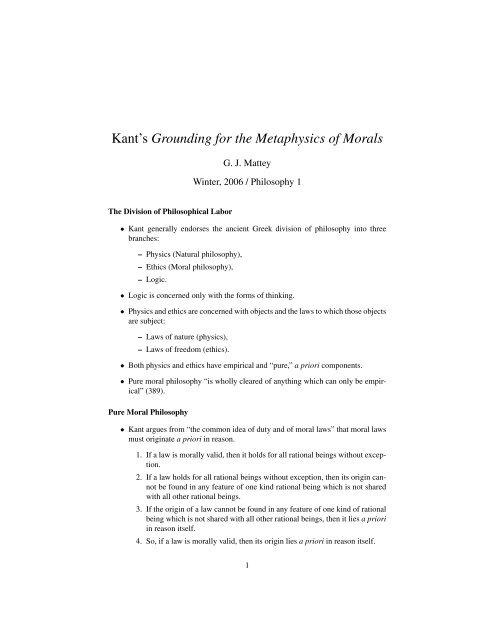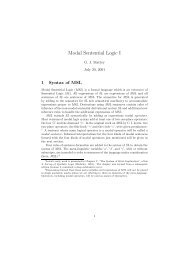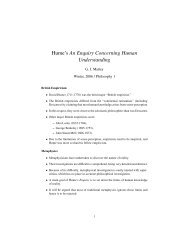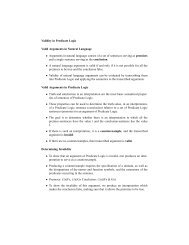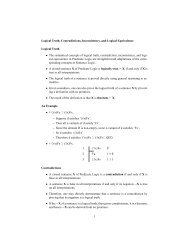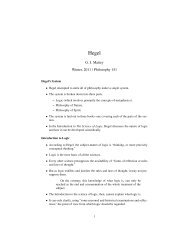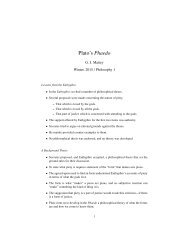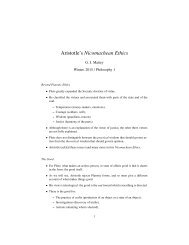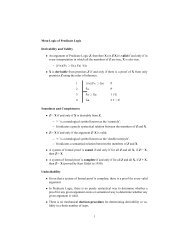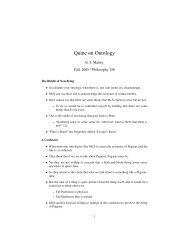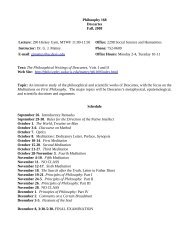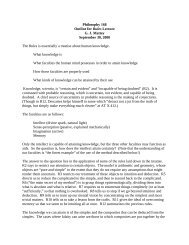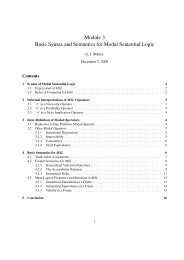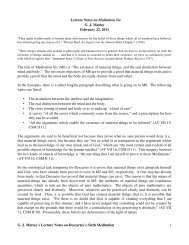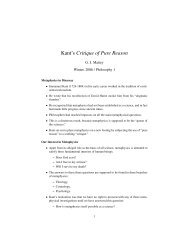Kant's Grounding for the Metaphysics of Morals - the UC Davis ...
Kant's Grounding for the Metaphysics of Morals - the UC Davis ...
Kant's Grounding for the Metaphysics of Morals - the UC Davis ...
Create successful ePaper yourself
Turn your PDF publications into a flip-book with our unique Google optimized e-Paper software.
Kant’s <strong>Grounding</strong> <strong>for</strong> <strong>the</strong> <strong>Metaphysics</strong> <strong>of</strong> <strong>Morals</strong><br />
G. J. Mattey<br />
Winter, 2006 / Philosophy 1<br />
The Division <strong>of</strong> Philosophical Labor<br />
• Kant generally endorses <strong>the</strong> ancient Greek division <strong>of</strong> philosophy into three<br />
branches:<br />
– Physics (Natural philosophy),<br />
– Ethics (Moral philosophy),<br />
– Logic.<br />
• Logic is concerned only with <strong>the</strong> <strong>for</strong>ms <strong>of</strong> thinking.<br />
• Physics and ethics are concerned with objects and <strong>the</strong> laws to which those objects<br />
are subject:<br />
– Laws <strong>of</strong> nature (physics),<br />
– Laws <strong>of</strong> freedom (ethics).<br />
• Both physics and ethics have empirical and “pure,” a priori components.<br />
• Pure moral philosophy “is wholly cleared <strong>of</strong> anything which can only be empirical”<br />
(389).<br />
Pure Moral Philosophy<br />
• Kant argues from “<strong>the</strong> common idea <strong>of</strong> duty and <strong>of</strong> moral laws” that moral laws<br />
must originate a priori in reason.<br />
1. If a law is morally valid, <strong>the</strong>n it holds <strong>for</strong> all rational beings without exception.<br />
2. If a law holds <strong>for</strong> all rational beings without exception, <strong>the</strong>n its origin cannot<br />
be found in any feature <strong>of</strong> one kind rational being which is not shared<br />
with all o<strong>the</strong>r rational beings.<br />
3. If <strong>the</strong> origin <strong>of</strong> a law cannot be found in any feature <strong>of</strong> one kind <strong>of</strong> rational<br />
being which is not shared with all o<strong>the</strong>r rational beings, <strong>the</strong>n it lies a priori<br />
in reason itself.<br />
4. So, if a law is morally valid, <strong>the</strong>n its origin lies a priori in reason itself.<br />
1
• Pure moral philosophy shows what <strong>the</strong> moral laws are, and how <strong>the</strong>y originate a<br />
priori in reason.<br />
• It is “indispensibly necessary” because knowledge <strong>of</strong> moral laws is required <strong>for</strong><br />
moral goodness:<br />
– What is morally good both con<strong>for</strong>ms to moral laws and is done <strong>for</strong> <strong>the</strong> sake<br />
<strong>of</strong> moral laws.<br />
The Good in Itself<br />
• Ancient ethicists claimed that <strong>the</strong> good <strong>for</strong> <strong>the</strong> human being is happiness (eudaemonia),<br />
however that is to be understood.<br />
• They claimed that “virtues” and external goods are what is conducive to human<br />
happiness.<br />
• Kant notes that both <strong>the</strong> “virtues” and external goods can help us to do bad things.<br />
• Even happiness can lead to bad states such as pride and arrogance.<br />
• If virtue or happiness go badly, it is because <strong>the</strong> person has a “bad will.”<br />
• The only way that we can avoid bad actions and bad states is through <strong>the</strong> exercise<br />
<strong>of</strong> a “good will.”<br />
• Kant concludes that a good will is <strong>the</strong> only thing which is good without qualification,<br />
or in itself.<br />
Moral Worth<br />
– Happiness is good only ins<strong>of</strong>ar as one is worthy <strong>of</strong> it, and one is worthy <strong>of</strong><br />
happiness only by possessing a good will.<br />
• A good will is a will that acts purely on <strong>the</strong> basis <strong>of</strong> duty.<br />
• Only such acts have moral worth.<br />
– An act that con<strong>for</strong>ms to one’s duty but which is per<strong>for</strong>med <strong>for</strong> some o<strong>the</strong>r<br />
reason has no moral value.<br />
– A merchant charges a fair price because it will build a loyal clientele.<br />
• Sometimes one’s duties conflict with one’s inclinations or selfish purposes.<br />
– I help a person I do not like, and who may even do me harm at some later<br />
time.<br />
• Acts per<strong>for</strong>med <strong>for</strong> duty and against inclination and selfish purpose have <strong>the</strong><br />
highest moral worth.<br />
• Even promoting happiness has moral worth only ins<strong>of</strong>ar as it done out <strong>of</strong> duty.<br />
2
Acting from Duty<br />
• An action that is done out <strong>of</strong> duty is an action which is done out <strong>of</strong> respect <strong>for</strong><br />
<strong>the</strong> law.<br />
• A dutiful action, like all o<strong>the</strong>r rational actions, proceeds according to a “maxim.”<br />
• Most maxims that motivate actions show us how to attain our ends.<br />
– When I my house is unhealthfully unclean, and I want to maintain my<br />
health, I act on <strong>the</strong> maxim “Clean <strong>the</strong> house.”<br />
• The maxim <strong>of</strong> a dutiful action is:<br />
– Follow <strong>the</strong> law, even if my inclinations are <strong>the</strong>reby thwarted.<br />
• So, an action which has moral worth will per<strong>for</strong>med solely in order to follow <strong>the</strong><br />
law.<br />
Following <strong>the</strong> Law<br />
• To sum up:<br />
– The only unqualified good is a good will,<br />
– A good will acts only from duty,<br />
– Acting from duty is acting in order to follow <strong>the</strong> law.<br />
• But what is <strong>the</strong> law which a good will strives to follow?<br />
• Since <strong>the</strong> law in dutiful actions is indifferent to any <strong>of</strong> its effects, it will be purely<br />
<strong>for</strong>mal in character.<br />
• The fundamental <strong>for</strong>mal character <strong>of</strong> law is its universal application.<br />
• So, to “follow <strong>the</strong> law” is to act in such a way that one is willing to allow <strong>the</strong><br />
maxim <strong>of</strong> acting to be applicable to all rational beings.<br />
• A good will is a will which acts in a way that it would have every o<strong>the</strong>r will act.<br />
An Example<br />
• I am in distress, and one way to get out <strong>of</strong> my dire situation is to make a promise<br />
that I intend to break.<br />
• I might <strong>the</strong>n act according to <strong>the</strong> following maxim:<br />
– “If <strong>the</strong>re is no o<strong>the</strong>r way to get out <strong>of</strong> trouble, make a false promise.”<br />
• Acting from such a maxim “follows <strong>the</strong> law” only if I am willing to allow this<br />
maxim to be applicable universally.<br />
3
• But I cannot will <strong>the</strong> universal adoption <strong>of</strong> <strong>the</strong> maxim.<br />
• For <strong>the</strong>n <strong>the</strong> maxim would be self-defeating, because it would result in a general<br />
breakdown in trust, in which case ei<strong>the</strong>r:<br />
– My present lie would not be believed, and hence <strong>of</strong> no help to me, or<br />
– It would be believed, but people would be entitled to lie to me in return.<br />
Why We Need Moral Philosophy<br />
• The preceding account <strong>of</strong> goodness is taken from nothing more than “<strong>the</strong> moral<br />
cognition <strong>of</strong> ordinary human reason.”<br />
• Ordinary use <strong>of</strong> reason is sufficient to determine what one ought to do and is<br />
available to everyone.<br />
• So it might be thought that <strong>the</strong> everyday use <strong>of</strong> reason, in its “happy simplicity,”<br />
is <strong>the</strong>re<strong>for</strong>e sufficient <strong>for</strong> <strong>the</strong> purposes <strong>of</strong> morals.<br />
• But a problem lies in <strong>the</strong> power <strong>of</strong> our needs and inclination, which push us away<br />
from strict devotion to duty.<br />
• There results a “dialectic,” in which <strong>the</strong> demands <strong>of</strong> duty are met with arguments<br />
in favor <strong>of</strong> <strong>the</strong> satisfaction <strong>of</strong> our needs and inclinations—in favor <strong>of</strong> “happiness.”<br />
• To secure <strong>the</strong>ir moral principles against <strong>the</strong>se arguments, ordinary people must<br />
turn to philosophy.<br />
Moral Concepts Are A Priori<br />
• Experience cannot reveal a single instance <strong>of</strong> an action per<strong>for</strong>med purely out <strong>of</strong><br />
a strict devotion to duty.<br />
• None<strong>the</strong>less, reason commands such actions, and we should investigate <strong>the</strong> origin<br />
<strong>of</strong> that command even if it will never be carried out.<br />
• The command to duty cannot arise from experience, because it holds <strong>for</strong> all<br />
rational beings.<br />
• And moral worth cannot be determined from examples, since we must first know<br />
what is morally good be<strong>for</strong>e we can determine what is a proper example <strong>of</strong> it.<br />
• Without an a priori moral philosophy, we are left with “a disgusting mishmash<br />
<strong>of</strong> patchwork observations and half-reasoned principles.”<br />
• Showing <strong>the</strong> a priori origin <strong>of</strong> moral concepts confers dignity on action from<br />
duty, which motivates dutiful action.<br />
4
Imperatives<br />
• When <strong>the</strong> human will acts <strong>for</strong> reasons, it does so by representing objective principles,<br />
which are called “commands.”<br />
• The <strong>for</strong>mula <strong>of</strong> a command is an “imperative,” and is expressed by an “ought.”<br />
– “Imperatives say that something would be good to do or to refrain from<br />
doing.”<br />
• Imperatives imply only to human will, as a “holy will” would not act from anything<br />
but objective laws <strong>of</strong> <strong>the</strong> good.<br />
• Imperatives command in two ways:<br />
– Hypo<strong>the</strong>tically: one should do x, in order to accomplish end y,<br />
– Categorically: one should do x, period.<br />
• Categorical imperatives alone are appropriate to morality.<br />
• We cannot tell from experience whe<strong>the</strong>r <strong>the</strong>y are ever obeyed, so <strong>the</strong>y must be<br />
investigated a priori.<br />
The Categorical Imperative<br />
• There is only one way to explain why one should per<strong>for</strong>m an action without<br />
taking into account its end:<br />
– The action is one that con<strong>for</strong>ms to a universal law.<br />
– I should do x because doing x con<strong>for</strong>ms to law, and not because <strong>of</strong> any end<br />
it might promote.<br />
• So a general <strong>for</strong>m <strong>of</strong> a categorical imperative is this:<br />
– Act in such a way that <strong>the</strong> maxim <strong>of</strong> <strong>the</strong> action can serve as a universal law.<br />
• Schematically, <strong>the</strong> categorical imperative functions in this way:<br />
– Should I do x?<br />
– Yes, if my reason <strong>for</strong> doing x can be a reason <strong>for</strong> everyone to do x.<br />
• This principle <strong>for</strong> action is now known as a principle <strong>of</strong> “universalizability.”<br />
5
The Categorical Imperative and Duties<br />
• The categorical imperative is a very abstract principle.<br />
• If it is to serve as a moral law governing <strong>the</strong> actions <strong>of</strong> rational beings, <strong>the</strong> specific<br />
duties <strong>of</strong> those beings should be derivable from <strong>the</strong> imperative itself.<br />
• Kant derives instances <strong>of</strong> four kinds <strong>of</strong> duties, which are arranged according to<br />
<strong>the</strong> way duties were understood in his time.<br />
Perfect<br />
Imperfect<br />
(Permits no exceptions) (Permits exceptions)<br />
To ourselves Preserve my own life Develop my talents<br />
To o<strong>the</strong>rs Make honest promises Help o<strong>the</strong>rs<br />
• In each case, a maxim allowing <strong>the</strong> violation <strong>of</strong> <strong>the</strong> duty cannot be universalized.<br />
An Example: Making Honest Promises<br />
• Perhaps <strong>the</strong> most famous <strong>of</strong> <strong>the</strong>se examples is that <strong>of</strong> a perfect duty to o<strong>the</strong>rs to<br />
make only honest promises to <strong>the</strong>m, an example that was examined in <strong>the</strong> First<br />
Section.<br />
• Because <strong>the</strong> duty is said to be perfect, it should admit <strong>of</strong> no exceptions.<br />
• Thus, it is <strong>for</strong>bidden to make a dishonest promise even if making that promise<br />
would help ourself (or someone else) escape from difficulty.<br />
• A maxim allowing <strong>the</strong> making a dishonest promise is not universalizable, because<br />
if it were, all trust would be destroyed.<br />
• If all trust is destroyed, <strong>the</strong>n making <strong>the</strong> promise would not serve my interest.<br />
• It is a standard objection to Kant that in some cases, such as that <strong>of</strong> preventing a<br />
murder, it is permissible to make a false promise.<br />
Justifying <strong>the</strong> Categorical Imperative<br />
• At this point, Kant has explained two things:<br />
– How an imperative could be categorical,<br />
– How a categorical imperative can account <strong>for</strong> all possible kinds <strong>of</strong> duties.<br />
• But he has yet to prove that <strong>the</strong>re is a categorical imperative that applies to all<br />
rational beings.<br />
• The pro<strong>of</strong> cannot be based on experience, given <strong>the</strong> generality <strong>of</strong> its application.<br />
• Yet it is tempting to appeal to empirical motives and laws, given <strong>the</strong> difficulty <strong>of</strong>:<br />
6
– Justifying objective laws like <strong>the</strong> categorical imperative a priori,<br />
– Deriving <strong>the</strong> authority <strong>of</strong> <strong>the</strong> categorical imperative to command from its a<br />
priori origin.<br />
• The task will require “a step into metaphysics.”<br />
The Ends <strong>of</strong> Action<br />
• Ends are what determine <strong>the</strong> will to action.<br />
• There are two kinds <strong>of</strong> ends:<br />
– Objective ends, which depend on motives that are valid <strong>for</strong> all rational beings,<br />
– Subjective ends, which depend on desires that are relative to individuals.<br />
• Objective ends are ends in <strong>the</strong>mselves, while subjective ends are only means to<br />
o<strong>the</strong>r ends.<br />
• Only objective ends could be <strong>the</strong> basis <strong>of</strong> a categorical imperative.<br />
– If <strong>the</strong>re is a maxim that promotes an end which all rational beings have,<br />
such a maxim could be willed to be a universal law.<br />
Man as an End in Itself<br />
• Kant maintains that every rational being exists as an end in itself.<br />
– “Rational beings are called persons inasmuch as <strong>the</strong>ir nature already marks<br />
<strong>the</strong>m out as ends in <strong>the</strong>mselves.”<br />
• An end in itself is an end <strong>for</strong> every rational being.<br />
• In <strong>the</strong> specific case <strong>of</strong> human beings, all humans are ends in <strong>the</strong>mselves and thus<br />
ends <strong>for</strong> every human being.<br />
• So I can universalize <strong>the</strong> following maxim:<br />
– Treat all o<strong>the</strong>r human beings as ends (and not as means to some end).<br />
• My reason <strong>for</strong> treating all humans (including myself) as ends is a reason <strong>for</strong> all<br />
humans to treat all humans as ends.<br />
• We can <strong>the</strong>n explain <strong>the</strong> duty <strong>of</strong> honest promising, on <strong>the</strong> grounds that to promise<br />
dishonestly to ano<strong>the</strong>r is to treat that o<strong>the</strong>r person as a means to my own ends.<br />
7
Legislating Universal Law<br />
• The moral law, as given in <strong>the</strong> categorical imperative, is not imposed on us from<br />
without.<br />
• Instead, it is dictated by <strong>the</strong> rational will itself.<br />
• So, given <strong>the</strong> universal scope <strong>of</strong> <strong>the</strong> categorical imperative, <strong>the</strong> rational will dictates<br />
universal law.<br />
• This universal law is independent <strong>of</strong> any <strong>of</strong> our special interests.<br />
• Because <strong>of</strong> its universal legislating activity, <strong>the</strong> will is called its “autonomous”<br />
(where “nomos” = “law”).<br />
• A will which is subject to external laws is “heteronomous.”<br />
• Autonomy <strong>of</strong> <strong>the</strong> rational will is <strong>the</strong> only way to explain <strong>the</strong> a priori origin <strong>of</strong><br />
<strong>the</strong> moral law.<br />
The Kingdom <strong>of</strong> Ends<br />
• The concept <strong>of</strong> an autonomous rational will gives rise to “ano<strong>the</strong>r very fruitful<br />
concept,” that <strong>of</strong> a “kingdom <strong>of</strong> ends.”<br />
• Kant claims that it is possible that <strong>the</strong>re be a systematic union <strong>of</strong> rational beings<br />
under legislation that mandates treating each one as an end.<br />
• Morality can <strong>the</strong>n be understood in terms <strong>of</strong> a possible kingdom <strong>of</strong> ends:<br />
– A moral act is one that is based on legislation that makes a kingdom <strong>of</strong> ends<br />
possible.<br />
• Potential membership in a kingdom <strong>of</strong> ends constitutes human dignity, which is<br />
intrinsic worth.<br />
• Dignity is beyond all price, because what has a price can be replaced by something<br />
with an equivalent price.<br />
• All <strong>the</strong> o<strong>the</strong>r virtues (skill at work, wit, etc.) give us only delight, which has a<br />
price but not intrinsic worth.<br />
The Good Will<br />
• In Section One, Kant claimed that according to <strong>the</strong> common conception <strong>of</strong> morality,<br />
only a good will is good in itself.<br />
• He now connects <strong>the</strong> concept <strong>of</strong> a good with <strong>the</strong> categorical imperative, which is<br />
<strong>the</strong> highest principle <strong>of</strong> morality.<br />
8
• A will which is absolutely good is a will whose maxims can be universalized,<br />
i.e. a will which acts only on <strong>the</strong> basis <strong>of</strong> <strong>the</strong> categorical imperative.<br />
• An absolutely good will <strong>the</strong>re<strong>for</strong>e be a will that legislates in <strong>the</strong> kingdom <strong>of</strong> ends.<br />
• Such a will is a “holy will,” which is <strong>the</strong> kind <strong>of</strong> will a supreme being would<br />
have.<br />
• The dignity <strong>of</strong> <strong>the</strong> human will lies not in its being subject to <strong>the</strong> moral law, but<br />
in its being <strong>the</strong> source <strong>of</strong> its own law as an autonomous being.<br />
Spurious Principles <strong>of</strong> Morality<br />
• All genuine moral principles presuppose <strong>the</strong> autonomy <strong>of</strong> <strong>the</strong> rational will.<br />
• Spurious moral principles presuppose its heteronomy.<br />
– The law governing <strong>the</strong> will is sought in its objects, not in itself.<br />
• Such laws can only be hypo<strong>the</strong>tical imperatives.<br />
• They may be based on ei<strong>the</strong>r:<br />
– Experience, or<br />
– Pure reason.<br />
Against Empiricism in Ethics<br />
• Empirical principles <strong>of</strong> morality promote happiness as an end.<br />
• They may do so in one <strong>of</strong> two ways:<br />
– As private happiness,<br />
– As a “moral feeling” that is produced by a special “moral sense.”<br />
• A principle that promotes private happiness does not distinguish between virtue<br />
and vice.<br />
• If <strong>the</strong>re is a “moral feeling,” promoting it would be superior to promoting private<br />
happiness.<br />
• But feelings are variable among people and <strong>the</strong>re<strong>for</strong>e cannot provide a universal<br />
standard <strong>for</strong> distinguishing right actions from wrong actions.<br />
9
Against Rationalism in Ethics<br />
• Some moral philosophers try to derive moral principles analytically from a concept<br />
<strong>of</strong> perfection:<br />
– Divine perfection, or<br />
– Ontological perfection (maximal degree <strong>of</strong> reality).<br />
• But a definite conception <strong>of</strong> divine perfection can only be constructed in two<br />
ways:<br />
– From ourselves, in which case we do not need to appeal to divine perfection,<br />
– From ideas <strong>of</strong> domination and vengenace, which have no place in morality.<br />
• We have no definite conception <strong>of</strong> ontological perfection (maximal degree <strong>of</strong><br />
reality).<br />
• Because it is empty, ontological perfection at least does not conflict with morality,<br />
and so it is better.<br />
• It is also better than any empirical concept, because it is not corrupted by a<br />
connection to experience.<br />
Rational Man and Natural Man<br />
• In Section Three, Kant discusses <strong>the</strong> question <strong>of</strong> how <strong>the</strong> categorical imperative<br />
is related to human beings.<br />
• If a human being has a rational will, it is autonomous and lays down <strong>the</strong> moral<br />
law <strong>for</strong> itself.<br />
• But human beings exist in <strong>the</strong> natural world and act in that world according to<br />
<strong>the</strong>ir desires and inclinations.<br />
• In order <strong>for</strong> it to be possible <strong>for</strong> humans to have an autonomous rational will,<br />
it must be possible to conceive <strong>of</strong> <strong>the</strong>m as beings acting independently <strong>of</strong> <strong>the</strong>ir<br />
desires and inclinations.<br />
• To do so, we must distinguish humans as appearances in nature and as things in<br />
<strong>the</strong>mselves that are not subject to natural “springs” <strong>of</strong> action.<br />
• Thus, our rational will, which is <strong>the</strong> basis <strong>of</strong> morality, must be conceived as a<br />
member <strong>of</strong> an intelligible world, in which we would do what in nature we ought<br />
to do.<br />
10
Compatibilism<br />
• The doctrine <strong>of</strong> <strong>the</strong> necessity <strong>of</strong> all natural actions appears to threaten <strong>the</strong> freedom<br />
<strong>of</strong> <strong>the</strong> rational will that underlies reality.<br />
• But <strong>the</strong>re is a way to reconcile <strong>the</strong> two.<br />
• A given human action may be regarded as <strong>the</strong> product <strong>of</strong> both:<br />
– Desire and inclination, and<br />
– The free exercise <strong>of</strong> <strong>the</strong> rational will.<br />
• The compatibility is due to <strong>the</strong> fact that <strong>the</strong> human being can be regarded as<br />
appearance and as thing in itself.<br />
• But although we must, <strong>for</strong> purposes <strong>of</strong> morality, think that we are free, we cannot<br />
comprehend how we are free.<br />
• And because it is detatched from all interests, we comprehend that <strong>the</strong> unconditional<br />
“ought” laid down by <strong>the</strong> categorical imperative is incomprehensible.<br />
11


